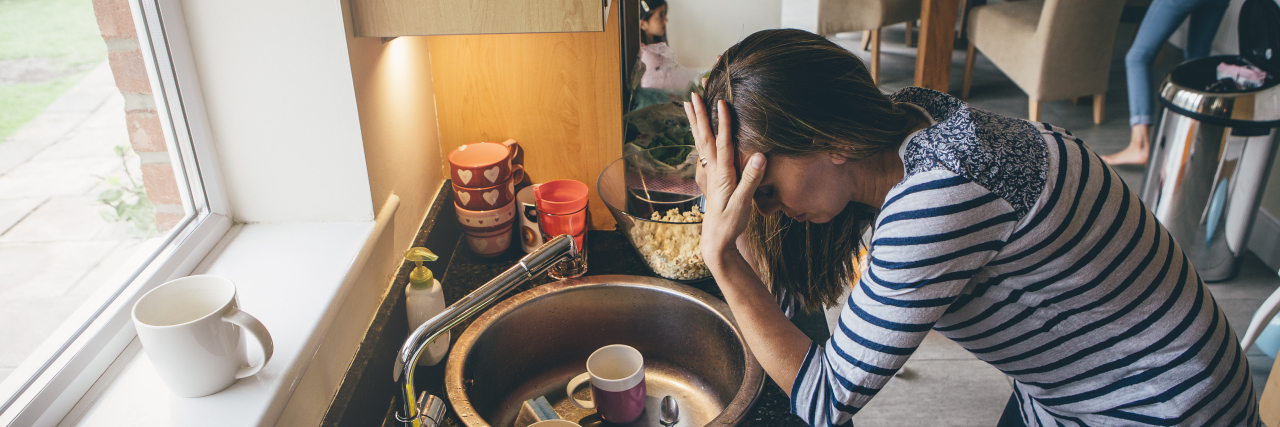I am 37 years old, a mum of three boys aged 11, 10 and 8, and carer of three dogs, nine hens, a budgie and a hamster. Our home is fairly chaotic as you might imagine, made more complicated by the dogs trying to eat the budgie and the budgie getting cheap but dangerous thrills from dicing with the jaws of death by teasing the dogs with his low swoops across the open-plan kitchen. My ideal day consists of not seeing anyone apart from my animals, being outside in nature or being curled up with a book.
I was diagnosed with Asperger’s syndrome (a form of autism) a few years ago, following the diagnosis of our eldest son (then 5), also with Asperger’s syndrome. I love my family. I would say we are a kind, thoughtful, quiet bunch who love being at home with our animals. To an outsider, we have a “normal” life; the kids are in local schools, my husband works and I stay home and car-share the school-run with another mum. We are friendly with our neighbors, and I have a few good friends (who I don’t see too often) but all this seeming normality hides how achingly hard it is for myself and my son to participate in typical activities. I often think how brave my eldest son is for facing his fears daily to go into school and socialize with his peers. I always struggled with anxiety, as my son does. I too struggled determinedly to push myself through the days in my teens and early 20s and even through university.
However, now I have reached mid-age I appear to have run out of endurance. I am emotionally exhausted and now have little strength to battle the anxiety that is beating at my door, wearing away my mind, soul and life. Consequently, I have fallen into depression, another companion of mine. Anxiety and depression are often associated issues for people on the autism spectrum.
During this last year, I felt so defeated and low that I was fighting urges to end my pain by suicide. The frustration I felt at myself for being what I perceived to be a failure led me to self harm, leaving permanent scars. Luckily, excellent family and medical support helped me out of this mindset. The prescription drugs and counseling gave me the scaffolding I needed to cling to in order to pull myself up out of the pit I had spiraled down into. Yet I still struggle daily with anxiety, acknowledging the danger of letting it overcome me and drag me down so low again.
I take medicines to support myself, but I still find so many things cause me to experience feelings of panic. These are things many other mums probably take for granted: shopping, the school run, going out, walking the dogs, meeting up with friends, people coming to my house, GP appointments, phone calls, meeting new people, going to unfamiliar places, driving unfamiliar journeys, parties, school events, going to church, evening activities outside of the home… and I could go on. The fear comes both from sensory issues common to autism (e.g. while shopping, from noise and bright lights) or from fear of interaction with other people (since I have had lots of bad experiences as I can misunderstand situations and inadvertently say the “wrong thing”). This is the “social impairment” aspect of autism. A lot of these things which cause me anxiety are shared by many other autistic people, but everyone is different in how their autism affects them.
I am a constant bag of nerves, since being a mum requires me to try to do all those things. Not doing them, or asking my parents or husband to do those things, makes me feel like a failure, a “bad mum.” Doing them causes me such stress that I feel utterly drained afterwards for a fairly long period of time, from hours to days. I can’t even work, so I don’t earn an income. I could not cope with juggling work and home anyway, since multi-tasking is very hard for me to do and causes me… you guessed it… anxiety! Then the anxiety and feelings of inadequacy result in depression.
Interestingly, people who I have confided in say they would not know I was feeling like this when they see me out, doing these things I hate. They often say they would not even know I have Asperger’s. My serene, smiling countenance masks the feelings well, which is common to people with Asperger’s, especially women. This trait is isolating as other people may not understand the issues I am struggling with just to be able to stop and chat with them in the school playground.
Asperger’s, anxiety and depression are all invisible, so people are often not sympathetic as they are not aware — and sadly some who are aware just don’t care and refuse to make allowances. So how can people help? Just by being aware, accepting a person for who they are and treating a person like me sensitively. Understand why we might not go to your party or call you on the phone, without taking it personally and being offended and annoyed with us. Please don’t assume we intend to be rude when we dash through the playground and try to grab our children at home-time and escape without having to converse with people.
Personally, I am OK talking about myself and the things I struggle with if people ask, but this will vary between people. The problem is when I tell someone and they reply with “Oh, don’t be silly, you don’t need to worry. Just come along to the party,” and pressure me. It would be better to tell me that your pets will be there, since I am more likely to come along to meet them!
We want to hear your story. Become a Mighty contributor here.
Getty image by TGL Images.

